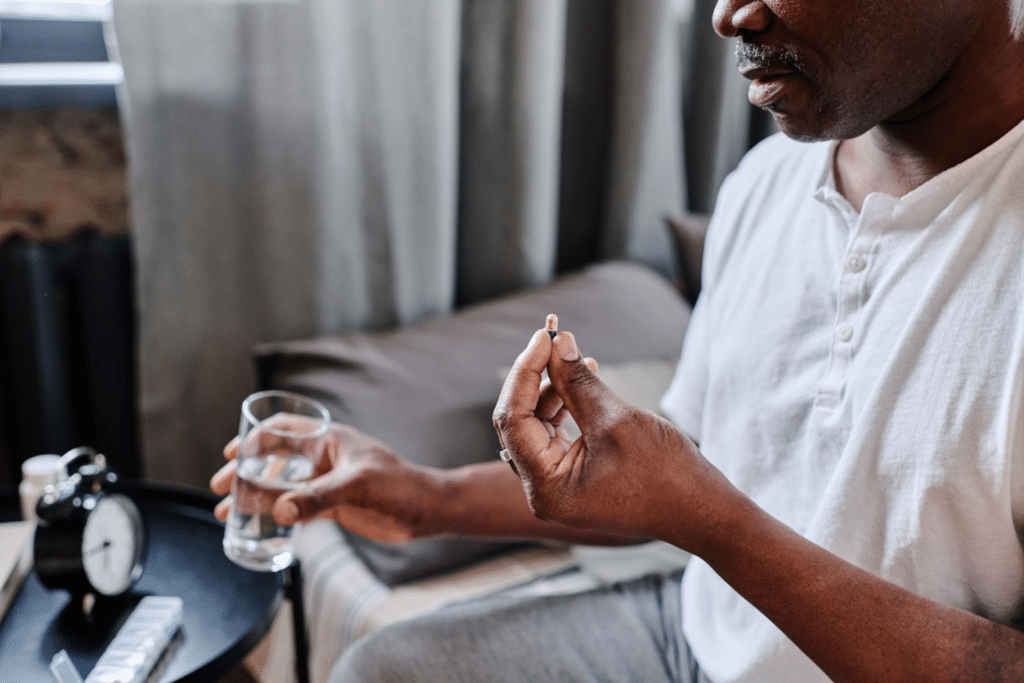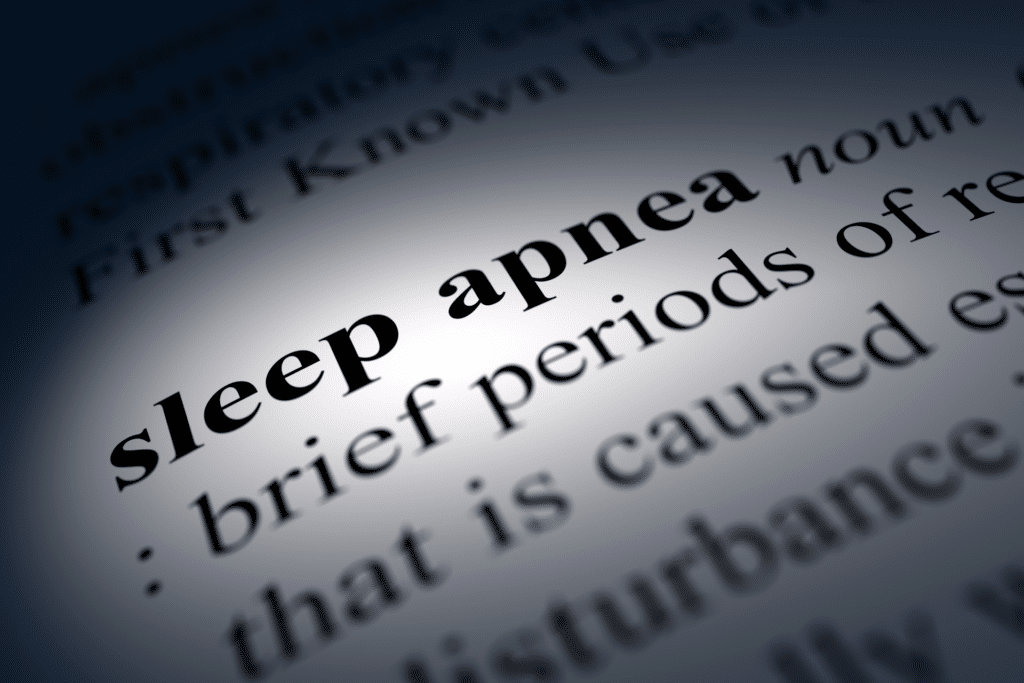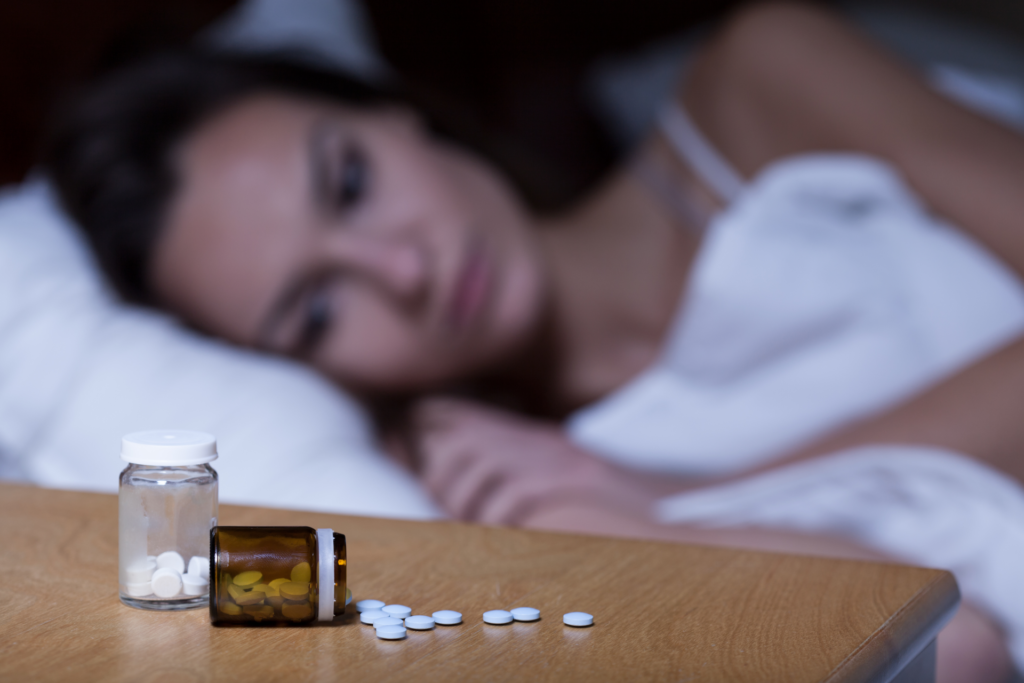Sleeping medication might often seem like the perfect solution for your sleepless nights. While sleep aids might be a nightly routine for many, medications can have an inverse effect if you are being treated for sleep apnea.
You may have never thought about how sleep aids and medications affect sleep apnea, let alone make your symptoms worse, but it’s important that you do! The prescriptions you’re taking may be inadvertently ruining your sleep, causing you to seek treatment for the wrong issues and making your sleep apnea worse. In a way, it would be like trying to lose extra weight just by lifting weights rather than eating a more balanced diet and living a healthier lifestyle.
The side effects of certain prescriptions and even over-the-counter sleep aids can wreak havoc on your sleep, but how do they impact your sleep apnea symptoms?
How Can Sleep Aids Hurt My Sleeping Habits?
A sleeping pill may seem like the magic solution to getting a better night’s sleep, but that magic solution may end up being a double-edged sword. Prescription sleep aids can cause multiple sleep issues, both short-term side effects as well as long-term. Even over-the-counter (OTC) options are not immune from these problems.
Some issues that can develop after taking sleeping pills can include:
- Developing a tolerance to the medication over time, requiring more of the medication to achieve the same effect as you did initially.
- Parasomnias or strange behaviors while asleep. This can include sleepwalking, sleep talking, or bedwetting. It’s not uncommon for those on stronger prescription sleeping medications to report parasomnias like sleep eating or even sleep driving either.
- Developing a dependence on your sleep medication after long-term use can become an addiction.
These side effects are especially prominent in benzodiazepine sleep aids, which is why it’s essential to exercise caution if you’re prescribed this medication, especially if you’re an older adult. [1]
If you also have obstructive sleep apnea on top of another sleep disorder like insomnia, prescription sleep medication may make your symptoms worse.
Related: Sleep Apnea and Insomnia: How These Common Sleep Disorders Can Be a Deadly Combination
Obstructive Sleep Apnea At a Glance
If you’re here reading this article, then you already have an idea of what sleep apnea is, what its symptoms are, and its associated health risks. You’re also probably already aware that sleep apnea is not like any other sleep disorder; it can’t be “cured” with medication, and it won’t go away on its own. That’s why you need the correct treatment for your sleep apnea symptoms.
CPAP therapy is the most popular treatment for obstructive sleep apnea, and for good reason— it works exceptionally well when you stick to your treatment regimen. However, CPAP may not be as effective as it can be if you’re using it improperly or if there are other factors affecting your sleep quality, such as prescription medication. There are thousands of prescription drugs on the market, though— so which ones are bad news for sleep apnea patients?
Which Medications Affect Sleep Apnea Symptoms?
As it turns out, many medications can worsen your sleep apnea symptoms. According to a collective study by the British Journal of Clinical Pharmacology, the medications that exacerbate sleep apnea symptoms (and should be avoided if you have the condition) include:
- Benzodiazepines, including Xanax, Valium, Klonopin, and Ativan.
- Opiates, including OxyContin, Vicodin, and morphine.
- Baclofen, a muscle relaxant and antispasmodic agent.
- Drugs that may cause weight gain, including Zyprexa, Paxil, and gabapentin. [2]
Benzodiazepines
Benzodiazepines like Xanax, Valium, and Klonopin can be especially problematic if you have obstructive sleep apnea. These medications stimulate your body’s gamma-aminobutyric acid (GABA) receptors, decreasing anxiety, relaxing your muscles, and providing a sedative effect. While they may be calming, these effects relax the muscles in your airways and depress your breathing, making your symptoms worse.
In addition, long-term use of benzodiazepines significantly increases your risk of dependency on these medications. These issues are a major reason why so many physicians and patients seek alternatives to benzodiazepine medications.
Opiates
Opiate medications used to treat pain, such as morphine, OxyContin or Vicodin, can depress your breathing rate and your breathing depth. This essentially means that you’re not breathing as deeply or as often as you should be if the medications are in effect while you sleep. Opiates also cause your chest and abdominal cavities to become more rigid, making it more difficult to breathe normally.
These side effects actually cause mild sleep apnea in patients treated with opioids, also making them all the more severe in patients with undiagnosed sleep apnea.
Baclofen
Baclofen, a muscle relaxant often used to treat multiple sclerosis or spinal cord injuries, can cause your upper airway to collapse while you sleep. It can also depress your respiratory drive, making it even more difficult to breathe normally.
Drugs that Cause Weight Gain
Being overweight or obese are the greatest risk factors for obstructive sleep apnea. Medications that cause weight gain, such as Zyprexa, Paxil, or gabapentin, can promote weight gain that can make you more likely to develop sleep apnea. If you already have OSA, that additional weight can worsen your symptoms and make the condition more severe.
What About Over-the-Counter Sleep Aids?
More research is still needed to determine the effect over-the-counter sleep medications such as melatonin have on obstructive sleep apnea. They may help you sleep a little better each night, but they won’t solve the underlying problems causing your sleep apnea symptoms.
Just like prescription medications, over-the-counter sleep aids like melatonin can easily turn into an unhealthy dependency. Melatonin supplements become less effective as the nights go by, and your body will create less melatonin when it expects a nightly dosage.
As we said earlier, the best way to treat obstructive sleep apnea is with CPAP therapy. CPAP therapy directly addresses the cause of your symptoms— an obstructed airway— and corrects it so that you can get a full, restful night’s sleep every night.
However, many people with obstructive sleep apnea don’t know that they have it because most symptoms occur while sleeping. As a result, they may be trying to find the right solution to the wrong problem, thinking that all they need is the right sleep aid to help them fall asleep, stay asleep, and wake up feeling rested.
So how can you get treated for sleep apnea if you don’t even realize you have it? A good rule of thumb is that if you’re having any kind of sleep problem, get tested! Your risk of sleep apnea depends on your physical health, age, and even genetics. An accredited sleep specialist can help you make sense of your symptoms and get to the bottom of what’s causing your sleep dilemmas.
If you’re in the Middle Tennessee area, help is always nearby.
Don’t Lose Sleep Over Your Medications
Prescription medications are often the most effective way to treat the litany of health problems that plague us, but they can also wreak havoc on your sleep if you’re not careful. This can be especially troublesome if you have sleep apnea and don’t even know it.
Getting tested for sleep disorders can help determine what exactly is causing your nighttime woes, but it can also help your doctor or a sleep specialist determine whether or not any medications you’re on are worsening the problem. Once you are fully informed, it’s infinitely easier to take the steps you need to get the restful sleep you deserve every night.
Not sure if you have sleep apnea? Take our sleep apnea quiz. It can help you make better sense of your symptoms so you can discuss them with your doctor or a sleep specialist.
If needed, a sleep specialist may recommend an overnight sleep study to evaluate your sleep patterns and determine whether or not sleep apnea is ruining your rest.
If you’re worried about your poor sleep, contact us at the Sleep Centers of Middle Tennessee today to schedule a consultation. You can still get a good night’s sleep, even if you have a sleep disorder— we can help.
References
- “Mayo Clinic Q and A: Sleeping Pills Should Be Used Cautiously, Especially among Older Adults — Mayo Clinic News Network.” Mayo Clinic, Mayo Foundation for Medical Education and Research, 10 Dec. 2015, newsnetwork.mayoclinic.org/discussion/mayo-clinic-q-and-a-sleeping-pills-should-be-used-cautiously-especially-among-older-adults/.
- Jullian-Desayes, Ingrid, et al. “Impact of Concomitant Medications on Obstructive Sleep Apnoea.” U.S. National Library of Medicine, British Journal of Clinical Pharmacology, 24 Nov. 2016, www.ncbi.nlm.nih.gov/pmc/articles/PMC5346880/.





